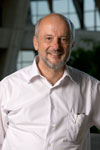Balance II
 |
| Fermilab Director Pier Oddone |
In last week's column I wrote about a question posed by Bill Brinkman, the Director of the Office of Science, to the lab directors on how to achieve balance between basic science and the urgent drive to address national energy and environmental needs. This week's column looks at factors that affect the balance in a little more detail, in particular as they pertain to particle physics.
Perceived opportunities and the cost to realize them: Many of the current difficulties in our field stem from the drive to position the U.S. to build the International Linear Collider by 2010, and the subsequent major change in direction after establishment of the ILC cost. The field passed over several opportunities at a smaller scale in the effort to aim all resources at the ILC. This made our field soft and vulnerable in the competitive environment of the Office of Science, especially with the delay in LHC results. The present plan, with a broader approach, multiple opportunities at a smaller scale and a significant accelerator R&D program that includes the ILC as one option, has received significant support both in the administration and Congress and may be more resilient.
A judgment of the value of basic research on fundamental questions relative to the potential impacts of end-use inspired basic research: This is the easiest factor to understand qualitatively and the hardest factor to understand quantitatively. As Einstein said: "Not everything that can be counted counts, and not everything that counts can be counted." Certainly the interest of the public in uncovering the mysteries of nature is very high, especially in those aspects that are the most mysterious and grand. The degree of attention on the LHC across the world is astounding. In every public lecture I give, the sense of support for our science is palpable. In addition, as a field we have produced many spinoff technologies with great impact on society and the economy. Yet this public support does not translate automatically into healthy budgets unless we present initiatives that are both exciting and realistic. These initiatives must compete against other scientific initiatives that promise direct impacts on applications.
The standing that the U.S. wants to take in this research in the world: If we want to be among the leaders in particle physics, we must lead in some domains. The LHC will dominate the energy frontier after the Tevatron, probably for as long as the Tevatron has dominated the energy frontier in the past. At the intensity and cosmic frontiers the US can maintain a leadership position, but this requires significant investments now, especially as other regions continue to develop their basic research in these areas as well. A clear definition of the US role in the field would help stabilize the balance and level of support.
The role that Office of Science plays as a steward of particle physics relative to the energy mission of the DOE: Within the overall investment in research in the US, which exceeds $60 billion, the fraction devoted to fundamental research is relatively small. The DOE's role in this small fraction is quite large. In recognition of the role that DOE plays in basic science, the name of the Office of Energy Research was changed years ago to the current name of Office of Science. The Office of Science recognizes the special role that DOE plays as steward of particle physics: it is still the second largest office within the Office of Science.
Although it is difficult to assign a specific weight to each of these four factors, they all contribute to establishing a balance. Underlying the whole, and needed to establish the right balance in today's competitive environment, is the set of opportunities that we develop in our plans and their support by our community, the broader scientific community and the public.
|